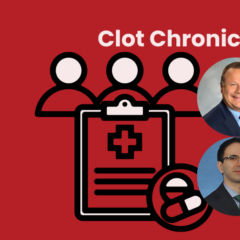Last updated on
Clot Chronicles: DECLARE-TIMI 58
Hi, my name is Steve Wiviott. I am a cardiologist here at Brigham and Women’s Hospital in Boston. I’m going to tell you a little bit about the DECLARE-TIMI 58 trial that we presented at the American Heart Association meeting this year. DECLARE-TIMI 58 was a trial looking at the effects of an SGL2 inhibitor, dapagliflozin, on patients with or at high risk for atherosclerotic cardiovascular disease.
The background of this trial was that patients with diabetes are at high risk for cardiovascular events, including myocardial infarction and heart failure. The SGL2 inhibitors are a class of drugs that treat diabetes and, in doing so, they result in glucose loss in the urine. This leads to reductions in blood volume, blood pressure, and weight, and therefore have a favorable effect on cardiovascular risk factors.
With this trial, we enrolled just over 17,000 patients. They were randomized to treatment with dapagliflozin 10 mg or placebo, and followed forward for a period of about 4.5 years. The major outcomes were safety related to cardiovascular events and also efficacy, with duel efficacy endpoints of MACE, which was cardiovascular death, myocardial infarction, or stroke, and also the combination of cardiovascular death and hospitalization for heart failure.
This trial was distinct from some of the other trials in this area in that it included a large proportion of patients who would be considered primary prevention, those patients without established cardiovascular disease. There were more than 10,000 patients in this category.
What we saw in the trial was that there were reductions in blood pressure, reductions in weight, and reductions in blood sugar, as would have been expected. From a cardiovascular standpoint, there was a significant reduction in cardiovascular death and hospitalization for heart failure. This was 17 percent lower with dapagliflozin driven predominantly by a reduction in hospitalization for heart failure, which was reduced by about 27 percent. In terms of major adverse cardiovascular events, ischemic events, we saw that this was non-inferior. There was no increase in the rate of these events, but we did not see a significant decrease in these outcomes. Also of note, we looked at kidney-related outcomes and with kidney-specific composite, we saw almost a 50 percent reduction in progression of kidney disease associated with the use of dapagliflozin.
One of the other questions that was asked about about this class of drugs was related to some safety issues that had been raised in previous trials. In terms of the overall safety, it appeared to be quite good with DECLARE. We did not see increases in the rate of amputations, we didn’t see increases in the rate of fractures, we didn’t see increases in the rate volume depletion events, which were things that had been raised in other trials. There were expected increases in genital infections and there was a modest increase, although rare, in diabetic ketoacidosis.
So the way that we put this whole trial together was that this was the largest trial of an SGL2 inhibitor, it had the broadest inclusion criteria, including both primary and secondary prevention patients. We see that there were significant reductions in events related to hospitalization related to heart failure and renal progression. These benefits seem to be consistent regardless of whether the patient had established disease, so secondary prevention, or whether the patient did not, primary prevention. They were also consistent regardless of whether the patient was known to have heart failure at baseline or not. We also then demonstrated that there was a fairly good safety profile with this drug that was reassuring in the context of previous studies.
One of the other things that we were able to do because of the timing of the publication was that we were able to do a meta analysis of these data that included the outcomes from both DECLARE and the previously studied drugs in this class: empagliflozin in the EMPA-REG OUTCOME study and canagliflozin in the CANVAS program. In this meta-analysis, it largely affirmed what we saw in the DECLARE trial, which was that there was a significant reduction in heart failure-related events. Those were consistent regardless of baseline features. There were really only modest reductions in the atherosclerotic events, particularly myocardial infarction. Those were isolated to the patients who already had established cardiovascular disease. We saw no myocardial infarction benefit in patients who were primary prevention. We also saw a robust reductions of renal outcomes.
So I think taking this together as a class, we see that the major effects of the SGL2 inhibitors seem to be in reducing hospitalization for heart failure and improving renal outcomes. This seems to be across a broad range of patients with diabetes at a relatively good safety profile. I think the implication from these data is that we as cardiologists should be thinking about our patients with diabetes and the opportunity to use proven therapies to benefit them in terms of their cardiovascular events.
Thank you, Dr. Wiviott!



